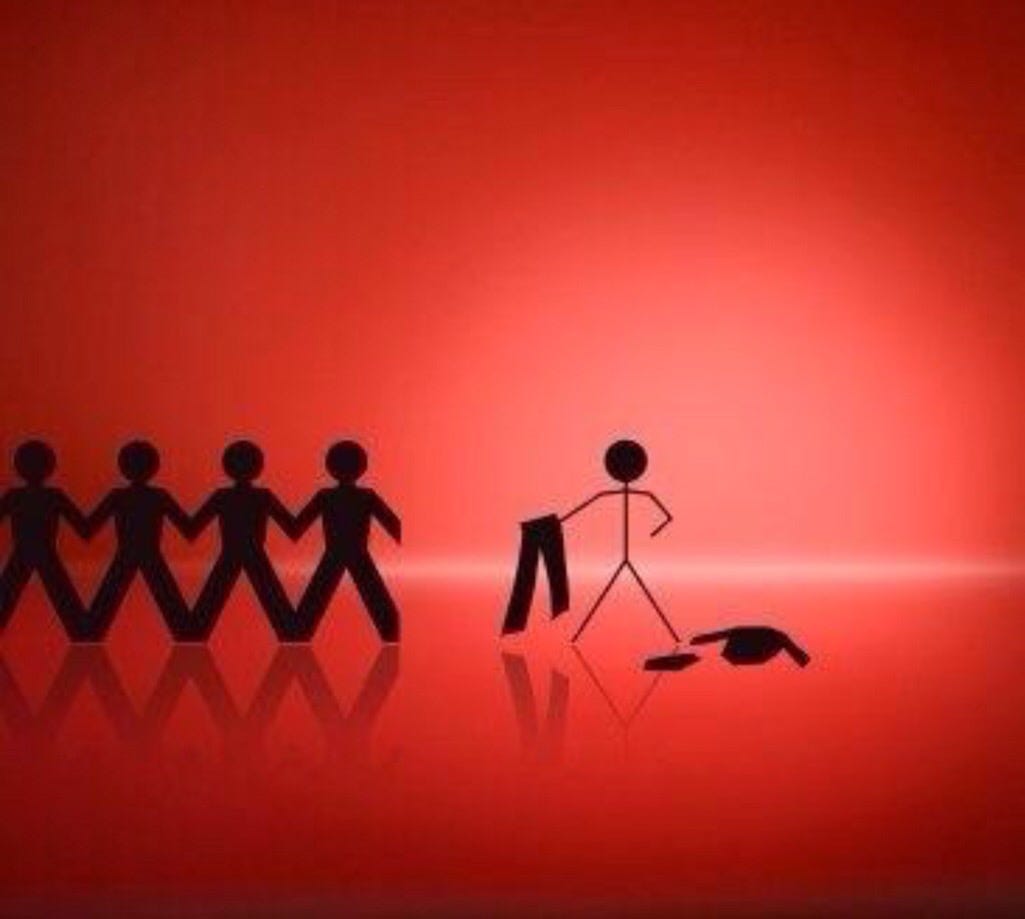Last winter I posted a poll on the state of fragmentation in the clothes free community. A recent post on the blog for a clothes free group geared towards young adults made me realize it continued relevance. It also got me think can the clothes free community survive if it's simply break off is special interest groups?
Individualistic society
American society and to a lesser degree North American society has long tradition of being more individualistic and less institutionally connected. We show a strong penchant for grouping together with our "own" kind (an innate human tendency) and less of a multi generational bent. So it is not at all surprising when any group decides to restrict its membership to a single group of people in order to cultivate a sense of belonging and community for those who fit the group criteria. Consider this recent comment on the YNA blog.
... it needs to come to the realization that there is adult nudism, gay nudism, young nudism, and public nudism (Bare to Breakers, WNBR, etc). There is no longer a "one size fits all" definition.
Can can naturism survive?
The question arises can the naturist, clothes free community survive if it adopts this social pattern as standard operating procedures? If each special interest group hives off into its own what then will hold the community together. How can we rally support for any clothes free cause if all we have are special "clubs"? Is this the future? Gay naturist, young naturists, straight naturists, Christian naturists, senior naturists, white naturists, student naturists, rich naturists all gather in their own groups to cultivate a sense of community while the clothes free community as a whole disintegrates? Is that strategy to get new people in clothes life bode well for the long term future of the clothes free community?
You may also like: the fault lies not in the stars but in ourselves part 1 fixed on naked bodies
I ask all these question because I think what is happening in the clothes free community reflects a bigger social trend. I believe leave that trend towards hiving with thinner and thinner networks of people sorting in group of people only like ourselves will have huge ramifications for the clothes free communities.
Paradigm shift
Instead of focusing on our differences and the challenges they present. I think we should try to find common ground to bring groups together. I realize it is easier to grow community if those belonging to the group are like us this principle has been used for many years in many different circles to grow groups expediently. But is it effective? Is it effective when we realize that these groups often wax and wane over time and if they disappear and there is no connection beyond the group what happens to the clothes free community then? Is it effective when this approach reinforces the kind of separation that the clothes free community experiences from broader society? Is it effective to reinvent the wheel to reach every new group we want to engage in the clothes free life?
Maybe we should take a page for the South African naturist playbook and focus on regional as opposed to demographic groups with a strong connection to an umbrella group. Most of the decision making and oversight should remain with the regional groups so special regional issues can be addressed. This approach I believe allowed the recent establishment South Africa's first official clothes ing optional beach.
The alternative in my opinion is the clothes free and naturist communities disintegrates into a fractured powerless and ineffective set of cliques and special interest groups which eventually become irrelevant. So what do you think?
This was first published on clothesfreelife.com December 2014. Visit clothesfreelife.com for more like this.





I fear that fragmentation and separation into ever-increasing numbers of boutique groups is not something specific to naturism. It is something that groups all over the world are dealing with. We live in an increasingly connected world, which allows people to find their tribe in increasingly niche groups. Many of us are easily triggered or offended by the slightest things, and head off to look for a group that satisfies our particular outlook on life. I believe the biggest threat to society is intolerance. We need to accept and welcome differences and variety, otherwise we will continue to isolate ourselves into increasingly irrelevant groups. We need to celebrate what we have in common, rather than focus on our differences.
How serious is this issue in the whole scheme of things? The article is nearly 10 years old. YNA has been defunct for some time. There are (perhaps) still gay naturist groups or religious naturist groups, though I see little about either. Is not the problem that the umbrella naturist organizations in this country, and their regional sub-organizations, are simply too feeble to actually promote naturism to a wider audience than that of current (usually older) naturists?
It would seem that if strong special-interest naturist groups actually existed that would be a plus. Especially in the case of younger people, who are needed for the continued existence of naturism in the future. And if a reasonably strong naturist organization for women actually existed, wouldn't that actually be good?
Any healthy society naturally comprises many distinct special interests. People like to associate with others with whom they have much in common. People potentially interested in naturism would look first for others who also share another interest or characteristic, such as gender, hobbies, philosophy of life, generation affinity, etc. As long as these subgroups also support naturism in general - which is in their own best interest - isn't promoting (hypothetical) things like "Hiking and Camping Naturists" a good idea? Shouldn't the umbrella national and regional organizations make this an important part of their strategy?
That is, if they actually had any reasonable strategy...